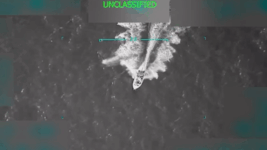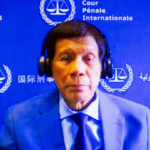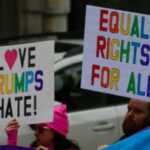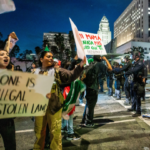Trump’s Extrajudicial Killings Signify a Further Erosion of International Law

The targeted military strike on a boat in the southern Caribbean that killed 11 people, on order of US president Donald Trump, after it had departed from Venezuela on Tuesday 2 September 2025, has been taken as a significant departure from the rule of international law on Washington’s part, as well as an indication of how it plans to war on its southern neighbours via the pretext of the drug war.
In a post on Truth Social, Trump justified the extrajudicial killings of foreign nationals in foreign waters, as those killed were “narcoterrorists” linked to Venezuelan gang Tren de Aragua. And as the assertion was that those on the boat were involved in the drug trade into the United States, this was an extreme form of extraterritorial defence, akin to that being waged by Israel in the Gaza genocide.
To legitimise this breach of international law as something of a grey area, Trump has recently signed an order directing the Pentagon to use military force against certain Latin American drug cartels that the White House has recently classified as terrorist groups, which serves to greenlight the US military in actively taking part in nondomestic drug law enforcement, although its actions do remain illegal.
Using the military to conduct law enforcement erodes the liberal democratic principle of civil government primacy, whilst the defence forces are restricted for domestic purposes in law, and there has been a general reluctance to use the military for law enforcement, except in the case of counterterrorism, which Trump purports was the way it was being used, without any proof provided.
The perpetrating of an extraterritorial hit on nationals from another country in international waters on the part of Trump is a significant development, despite his genocidal ally Israeli PM Benjamin Netanyahu engaging in such lawbreaking regularly. And it has heralded in a brave new reality where there is precedent for governments to assassinate foreigners overseas in violation of global law.
Open slather
In regard to Trump’s secretive directive to hunt Latin American drug cartels deemed terrorist organisations, The New York Times reported on 8 August that it “provides an official basis for the possibility of direct military operations at sea and on foreign soil against cartels”, as happened to the Venezuelan boat in the Caribbean that was moving in the direction of the Guayana Region.
In the past when the US has been concerned with drugboats making their way into US waters, US Coast Guards have intercepted them to prevent the drugs from making their way onto American streets. However, this latest operation was different, as it was not part of a law enforcement operation to prevent drug trafficking, rather the US simply murdered eleven alleged narcoterrorists.
On Trump’s behest, the US State Department listed eight Latin American drug cartels, including Tren de Aragua, as foreign terrorist organisations in February. Trump’s “lethal strike” was accompanied by assertions from US secretary of state Mark Rubio and US secretary of war Pete Hegseth that this was the first strike in a new counterdrugs and counterterrorism campaign.
However, a foreign terrorist organisation listing does not result in the authority to kill foreign nationals overseas in either US domestic or international law.
“Earlier this morning, on my orders, US military forces conducted a kinetic strike against positively identified Tren de Aragua narcoterrorists in the SOUTHCOM area of responsibility,” Trump outlined after the attack. “TDA is a designated foreign terrorist organisation operating under the control of Nicolas Maduro, responsible for mass murder, drug trafficking, sex trafficking and acts of violence.”
Trump declared Venezuelan president Maduro a narcoterrorist in his first term, and he’s currently insisting that the South American leader, whose nation is sitting on the largest oil reserves on the planet, is the head of Tren de Aragua. And Trump has now deployed eight warships off the coast of Venezuela beginning on 21 August. Indeed, the US has long sought Venezuelan regime change.
Say goodbye to the end of the war on drugs
A significant civil society campaign to end the war on drugs has been underway in western nations over recent decades. The US was once the chief instigator of global drug prohibition. Yet, various US states have been legalising recreational cannabis since 2012, which has been influential in changing attitudes towards illicit substances and the viability of trying to eradicate them worldwide.
The push towards global drug control began in the early 20th century, with a view to the opium crisis in China. Various treaties were established, which culminated in the 1925 Geneva Convention. The 1961 UN Single Convention on Narcotics Drugs then heralded in the modern era of drug prohibition, and in 1971, the US Nixon administration launched the war on drugs.
US president Richard Nixon is understood to have launched the war on drugs domestically to counter the antiwar left and to crack down on Black communities in general. The campaign further marked an enhancement of domestic law enforcement and international measures to counterdrugs. And when a war is waged against a nonexistent foe, the governing laws can easily be blurred.
The Global Commission on Drug Policy declared the war on drugs a failure in 2011, as it has resulted in a proliferation of stronger drugs, the growth of global criminal networks and mass incarceration.
Yet, Trump’s recent use of the war on drugs as reason to attack Latin American nations and to reestablish the US sphere of influence in the region, as per the 19th century Monroe Doctrine, reveals a key reason why drug prohibition is likely here to stay.
“Flooding American streets and killing Americans”
“Suffice it to say that the president is going to be on offence against drug cartels and drug trafficking into the United States. It destabilizes not just the country but the entire Caribbean Basin. These particular drugs were probably headed to Trinidad or some other country in the Caribbean, at which point they just contribute to the instability these countries are facing,” said the US state secretary.
Rubio made the comments while speaking to reporters on 2 September, in the wake of the “lethal strike”. He added that as the US vessels are in the Caribbean, Trump will continue to take action to prevent his nation from being “flooded with cocaine and fentanyl and other drugs coming from different places”.
Yet, the warships and a submarine that the US has deployed off the Venezuelan coast in a show of might in tackling the drug war, can too be perceived as the US stationing its naval vessels off the coast of another nation it’s threatening to illegally attack with the end goal of securing the largest oil reserves on the planet, while the Trump administration is not at all concerned with the flow of drugs.
As the US state secretary readily admits, this is likely not the only Latin American nation Trump is gearing up to attack militarily on the pretext of the drug war, which doesn’t provide any international legal authority to pursue such measures. And despite Trump officials claiming the operation was sanctioned self-defence under international law, legal experts counter it as being unjustified.
So, as the recent lethal strike that the Trump administration made upon a boat leaving Venezuela has indicated, a new period of international lawlessness is upon us, which is an era that was birthed by Israel’s wholesale commission of atrocities in the Gaza Strip, and has been officially flagged as underway by the White House’s decision to throw the international rulebook out the window.







